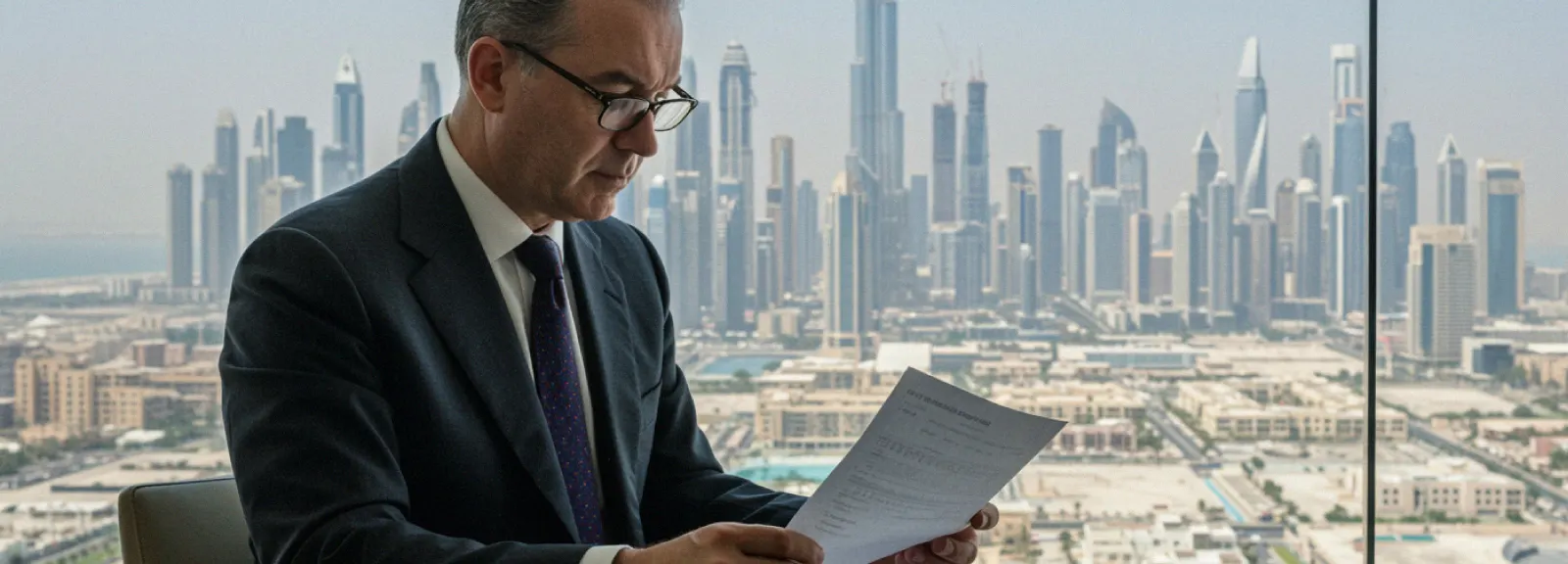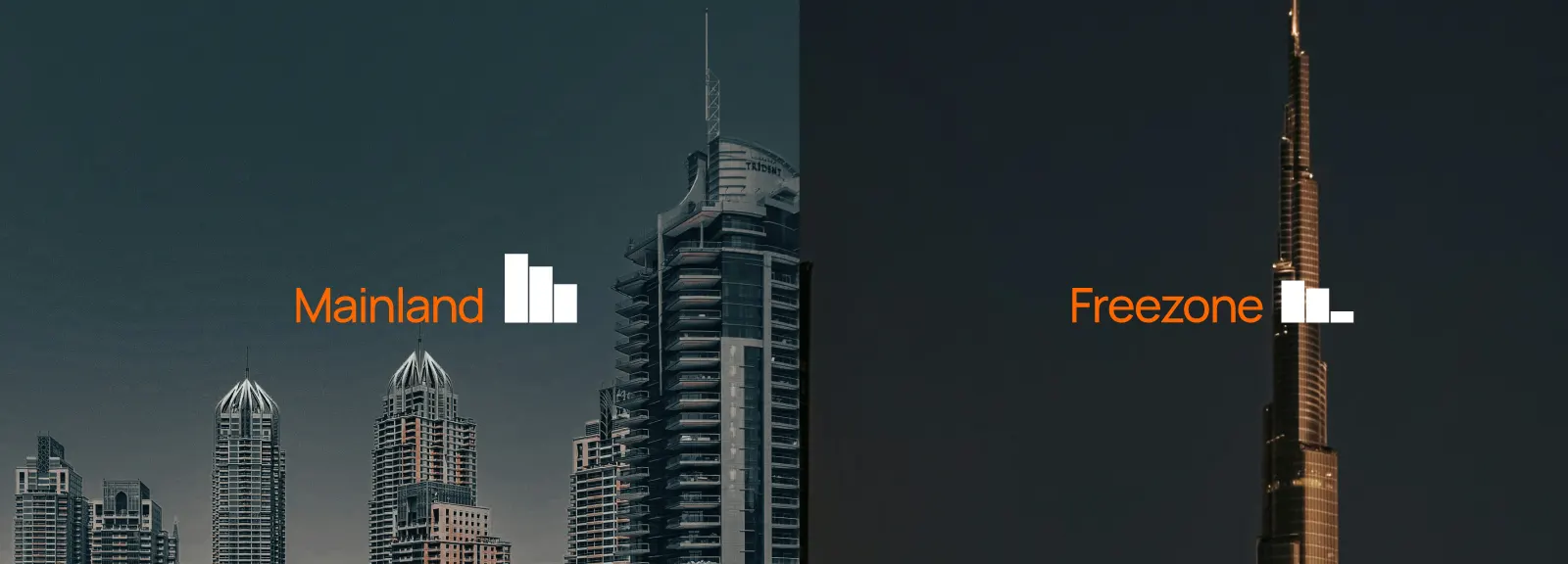In 2025, the pressure on ultra-high-net-worth (UHNW) families to rethink how their wealth is structured has never been higher. With growing regulatory scrutiny, increased transparency requirements, and the complexities of cross-border holdings, relying on outdated systems is no longer a viable option.
More families are choosing to consolidate and safeguard their assets in jurisdictions that offer strong legal clarity, global credibility, and tax efficiency. The DIFC family office has emerged as the preferred structure for achieving those goals.
In this blog, we’ll look at why more UHNW families are restructuring their wealth in 2025. We’ll explain what makes the DIFC family office so attractive. We’ll walk through seven major advantages of setting up in DIFC. You’ll also see what a real DIFC family office setup actually looks like, what the full process involves, and why acting now is smarter than waiting. We’ll end with a short FAQ that clears up common questions.
Whether you’re exploring options for succession, investment consolidation, or long-term privacy, understanding how a DIFC family office works is essential.
Table of Contents
Why Every UHNW Family Is Rethinking Their Wealth Structure in 2025

The strategies that worked a decade ago are no longer enough to protect generational wealth. In 2025, UHNW families are facing a new set of pressures—legal, financial, and reputational. A DIFC family office has quickly become the preferred solution.
Here’s why UNHW families are making the shift to DIFC Family Office:
1. Global transparency rules have changed everything
- The Common Reporting Standard (CRS) now mandates automatic sharing of financial account information across 120+ countries.
- There’s no such thing as anonymous offshore banking anymore. In fact, over €12 trillion in financial account data has already been exchanged globally under the CRS.
- Families with outdated structures are seeing their accounts flagged or even frozen.
- A DIFC family office offers full compliance while preserving control.
2. Offshore structures are being rejected by banks
- Jurisdictions like BVI, Seychelles, or Belize are raising red flags with European and Gulf-region banks.
- Even UAE-based banks are turning away clients without clear substance or governance.
- A DIFC family office provides institutional-grade credibility that banks recognize and trust.
3. Economic Substance Regulations (ESR) are tightening enforcement
- Families must prove their entities are not just passive shells.
- DIFC offers the ability to meet ESR requirements through actual presence—registered office, local representatives, and governance setup.
4. Political and tax instability is pushing families to relocate structures
- Major economies are rolling out inheritance taxes, wealth taxes, and public UBO (ultimate beneficial ownership) registers.
- Many UHNW families are shifting to neutral, regulation-friendly jurisdictions.
- A DIFC family office gives them protection from policy swings while remaining globally respected.
5. Families are more complex than ever
- Heirs live across the UK, UAE, US, and Europe.
- Ownership is spread across real estate, venture funds, operating businesses, and collectibles.
- A DIFC family office brings everything under one roof—with clear reporting, governance, and planning.
6. Private banks and advisors prefer clean, structured entities
- Many institutions now require clients to have compliant legal structures before onboarding.
- A DIFC family office streamlines onboarding, improves access to financial tools, and reduces friction in asset management.
7. Legacy planning needs more than just a will or trust
- Families want to ensure long-term control, not just tax savings.
- With a DIFC family office, they can set up multi-generational rules through charters, foundations, and family constitutions.
Why the DIFC Family Office Is Becoming the Gold Standard
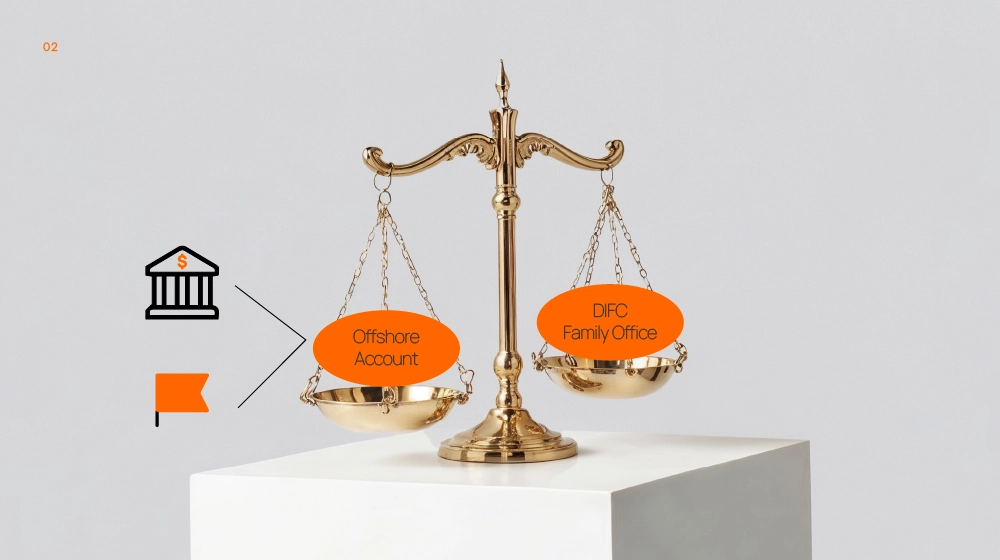
The DIFC family office is not a trend. It’s a permanent shift in how global families structure wealth.
Located in the Dubai International Financial Centre (DIFC), this type of family office provides a legal and administrative base for managing private capital, assets, and governance. Backed by English Common Law and regulated by a globally recognized authority, it offers something few other jurisdictions can: certainty.
Unlike traditional offshore vehicles, a DIFC family office gives families the ability to:
- Centralize global wealth in one legally sound jurisdiction
- Combine investment, governance, and succession in one structure
- Maintain privacy without triggering red flags
- Build structures that outlast tax law shifts and political cycles
The growing number of UHNW families relocating their legal structures to Dubai reflects the growing credibility of DIFC. For families thinking generationally, the DIFC family office provides the infrastructure to protect wealth, clarify ownership, and ensure smooth succession.
We also covered how to build a tax-efficient business structure in Dubai for families that operate across multiple regions.
7 Core Advantages of Setting Up in DIFC
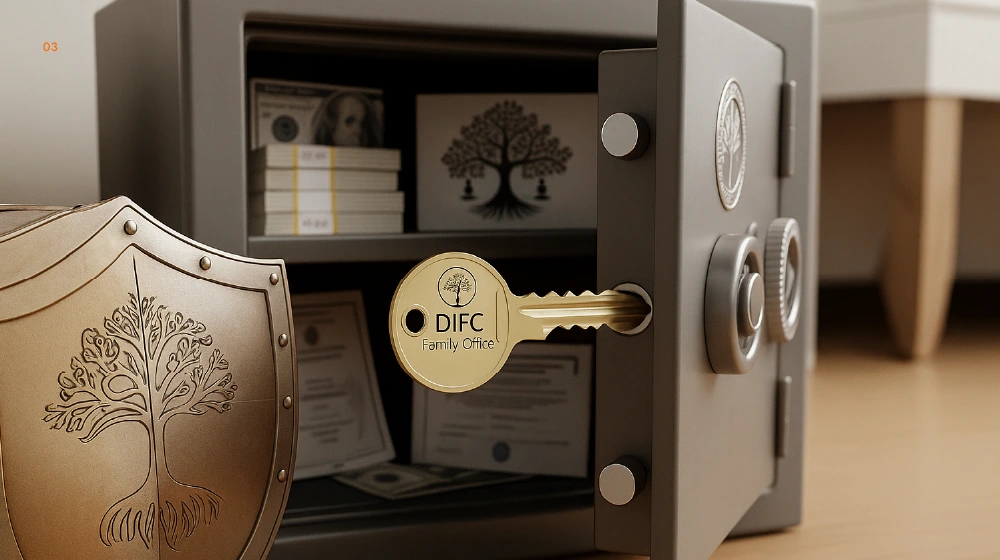
The DIFC family office model stands out not just for its location, but for its unmatched mix of legal, financial, and operational advantages.
Here are seven reasons why it has become the top choice for serious families:
1. 0% Tax Environment
DIFC offers 0% tax on income, capital gains, and dividends. There’s no inheritance tax, no wealth tax, and no withholding tax on transfers. This makes DIFC one of the most tax-efficient locations globally for long-term wealth. That said, families with operating companies in the UAE still need to understand how corporate tax registration works, even if the family office itself is exempt.
2. Common Law Legal System
DIFC operates under its own independent legal system based on English Common Law. This offers families more predictable dispute resolution and protection compared to civil law regimes.
3. Strong Privacy and Confidentiality
While complying with global transparency rules, DIFC allows private family structures (such as foundations and trusts) to keep ownership and governance details confidential. This is increasingly valuable in a world of automatic exchange of information.
4. Full Control with Structured Governance
Families can define how decisions are made, whether through a family board, investment committee, or trust protector. A DIFC family office gives structure without giving up control.
5. Multi-Jurisdictional Compatibility
Whether a family holds property in London, a business in Singapore, or a VC portfolio in California, a DIFC family office can wrap around all of it legally and operationally.
6. Access to Global Financial Services
DIFC is home to over 600 financial institutions. From private banks and asset managers to legal firms and tax advisers, families have access to a full ecosystem.
7. Foundation and Trust Options for Succession
Families can register DIFC Foundations and Trusts that align with their religious, cultural, and financial goals while staying compliant with international standards. This is essential for smooth intergenerational transfer.
Each of these benefits works together. Together, they make a DIFC family office not just viable, but ideal.
What a Properly Built DIFC Family Office Actually Looks Like
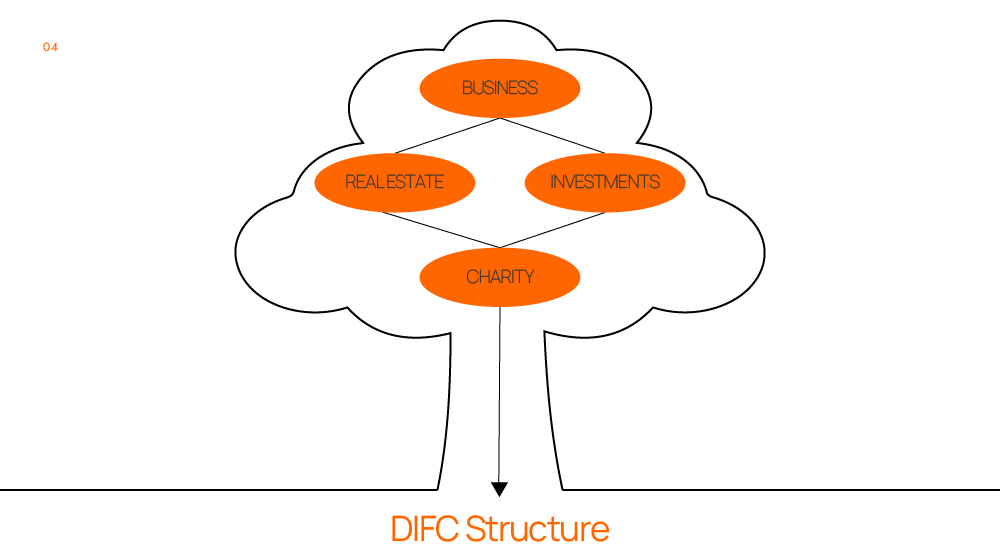
No two families have the same assets or goals. But when a DIFC business setup is done properly through a family office, a few key pieces always show up. These are the parts that make the structure work. Not just today, but for decades.
Here’s what that looks like in 2025:
You’ll usually see a holding company inside DIFC.
DIFC holding company owns the shares, the property, the investments, all in one place. It gives the family one point of control. Banks and advisors prefer it. And it makes things clear for future generations.
A DIFC Foundation often sits right alongside.
This is the rulebook. It protects assets, lays out succession rules, and makes sure the family’s wishes stay in place even if leadership changes. Without a foundation, those rules are harder to enforce.
Most DIFC family office setups include a family charter.
This isn’t just paperwork. It explains how decisions get made, what happens if there’s a disagreement, and what the family stands for. It keeps everyone on the same page.
There’s usually an investment committee.
Rather than each person making their own calls, this group reviews deals, manages risk, and sticks to a clear plan. Some families include outside experts here too.
All banking and investments flow through the family office.
Instead of holding 10 accounts in 4 countries, a DIFC business setup helps consolidate everything. That makes compliance easier, and banks are more willing to work with the structure.
Trusted advisors are always close by.
Legal, tax, and compliance experts often work directly with the office. That way, before any decision is made whether it’s buying a company or gifting property, someone has reviewed the risks.
Many families add a philanthropy arm.
Whether it’s local charity, education, or global giving, the DIFC business setup gives families a clean and strategic way to handle donations with proper oversight.
If you’re comparing options, it’s worth understanding the different types of licenses in Dubai. Many families hold commercial entities alongside their family offices.
The DIFC Setup Process: What It Takes to Do It Right
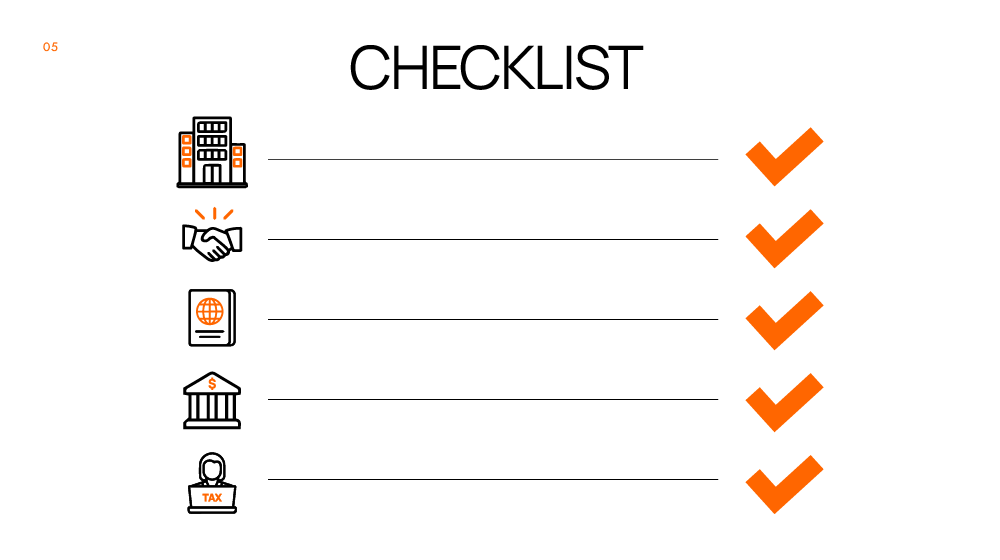
Setting up a DIFC family office in 2025 is not overly complicated but it’s not just a paperwork task either. Banks, regulators, and service providers all expect a clean, compliant, and well-thought-out structure. And when it’s done right, the DIFC family office becomes a long-term platform for wealth, governance, and privacy.
Here’s how the process works when it’s properly executed:
1. Define your objectives.
Start by being clear on what the family office is meant to do. Is the focus on managing international investments? Preparing for succession? Coordinating global philanthropy? The structure of the DIFC family office depends entirely on the family’s goals and must align with the relevant DIFC license categories. Without this step, everything else becomes harder to get right.
2. Work with a DIFC-approved corporate service provider.
Only licensed DIFC company setup providers can assist with incorporation and ongoing compliance in the DIFC. They’ll help with choosing the right legal structure, preparing the application, submitting to the DIFC Registrar of Companies, and ensuring the setup meets both local rules and global standards. For a broader look at launching any type of company, here’s a step-by-step guide to starting a business in Dubai.
3. Choose the right legal structure.
The two most common options are a Private Company Limited by Shares and a DIFC Foundation. The company model is ideal for families focused on active investments and asset management. The foundation is preferred for succession planning and family governance. In many DIFC family office setups, families use both together—one to hold and manage assets, and the other to govern how those assets are used across generations.
4. Secure a registered office in DIFC.
A DIFC family office must have a legal address inside the financial center. This can be a dedicated office or a flexi-desk, depending on operational needs. Without it, you can’t proceed with licensing, and banks won’t accept the setup as valid.
5. Appoint directors, guardians, or board members.
Each DIFC family office needs a formal governance structure. That includes naming the people responsible for oversight—whether it’s a board of directors for a company, or guardians for a foundation. These individuals don’t always have to reside in the UAE, but they must be clearly documented and meet eligibility requirements.
6. Open local or international bank accounts.
Once the DIFC family office is licensed, it can apply for banking and custody accounts. The DIFC’s reputation makes it easier to get accepted, especially compared to offshore jurisdictions. That said, the bank will still require source-of-wealth documents, UBO (ultimate beneficial ownership) details, and proof that the structure is clean. For families facing issues with banking, here’s a guide on how to open a business bank account in the UAE without delays.
7. Set up your internal advisors.
A well-run DIFC family office doesn’t rely on external firms for every decision. Most families bring in trusted tax advisors, legal counsel, and compliance support either in-house or on retainer. This ensures that investment, estate, or operational moves are reviewed before they’re executed.
8. Handle compliance year after year.
DIFC requires annual license renewal, office lease renewals, economic substance filings (where applicable), and sometimes audited financials. These aren’t optional. If you fall behind, the family office can lose its legal status, or worse, risk account closures and fines.
9. Update the structure as the family evolves.
A good DIFC family office isn’t static. As the next generation comes in, asset types change, or new jurisdictions come into play, the office needs to be updated. That might mean amending the charter, adjusting investment strategy, or changing governance.
Skipping any of these steps or doing them halfway can lead to serious issues: bank account rejections, delays in licensing, or even the need to start over. That’s why most families work with trusted DIFC specialists who don’t just set things up, but plan ahead for what comes next.
Protect Your Wealth While You Still Can with a DIFC Family Office
The window to act is narrowing. What’s possible today in DIFC may not be available a year from now. Regulatory tightening, increased information-sharing between jurisdictions, and shifting global tax standards are making it harder for families to protect and organize their wealth discreetly—especially for those considering structures like the DIFC category 4 license.
A properly structured DIFC family office gives you the control and legal clarity you need but only if it’s done right, and done soon.
At GCG Structuring, we work exclusively with families who want more than just paperwork. We help you define clear objectives, build the right structure from the ground up, and stay compliant without sacrificing privacy or control.
From entity selection and licensing to long-term governance and advisory, we make sure your DIFC family office is built to support your family’s interests across generations, not just the next tax cycle.
If you’re serious about protecting your wealth before the rules shift again, now is the time to move.
FAQ
1. 0 Can any family set up a DIFC family office?
Typically, families with assets above USD 10 million find DIFC family offices cost-effective. There’s no legal minimum, but there are practical thresholds due to setup and compliance costs.
2. 0 Is the DIFC family office regulated by the DFSA?
Not always. If the office doesn’t offer services to third parties and doesn’t manage external funds, DFSA licensing is not required.
3. 0 How long does setup take?
On average, 3 to 6 weeks if all documents and approvals are in order.
4. 0 Is a local office or employee required?
Yes. A registered address inside DIFC is mandatory, and at least one authorized signatory or representative must be appointed.
5. 0 What’s the cost of setting up a DIFC family office?
Costs vary depending on the complexity of the structure. Initial setup typically ranges from USD 25,000 to USD 50,000. Annual operating costs (including advisory, office rent, and compliance) range from USD 20,000 to USD 100,000.
6. 0 What’s the difference between DIFC and other UAE Free Zones?
DIFC is the only jurisdiction in the UAE operating under English Common Law. It offers international-grade legal protections, full access to global financial services, and advanced wealth structuring tools unlike other free zones focused on trading or commercial activity.
7. 0 Can I include philanthropy in the structure?
Yes. Families can register charitable foundations or trusts under DIFC rules to manage giving locally or internationally in a structured and compliant way.
8. 0 Can I include family members who live abroad in the DIFC family office?
Yes. DIFC family offices are often designed for multi-jurisdictional families. Cross-border coordination is one of their core strengths, provided proper compliance and reporting are maintained.
9. 0 Does a DIFC family office help with CRS and FATCA compliance?
Yes. DIFC family office structures are well-aligned with global transparency rules. Their legal clarity and documentation make CRS and FATCA reporting far more straightforward for both families and banks.
10. 0 Can a DIFC family office hold real estate in other countries?
Yes. A DIFC family office can own real estate globally through underlying entities. This allows families to separate ownership from personal names while improving tax and estate planning outcomes.


